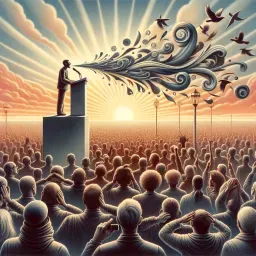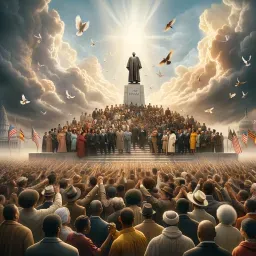I have not yet begun to fight!

- Meaning
- This phrase epitomizes unwavering determination and an unyielding spirit in the face of adversity. John Paul Jones reportedly made this exclamation during a pivotal naval battle, reflecting his tenacity and refusal to give up, even when circumstances seemed dire. It underscores a mindset of perseverance, encouraging individuals to continue fighting for their goals despite significant challenges or pressures to quit.
- Allegory
- The elements in this image are carefully chosen to illustrate the phrase's powerful message. John Paul Jones' resolute stance on a damaged ship amidst an active battle symbolizes undeterred courage and leadership. The twilight setting and the glow of cannon fire add a dramatic touch, underscoring the perilous situation. The turbulent waters represent the chaotic and unpredictable nature of challenges faced. Overall, this imagery seeks to visually reinforce the concept of not surrendering despite severe hardships, staying true to the essence of the commanding exclamation: "I have not yet begun to fight!"
- Applicability
- The teaching of this phrase can be applied in numerous ways: individuals can draw inspiration from it to persist through difficulties in their personal or professional lives. Whether facing a tough project at work, overcoming personal challenges, or striving to reach long-term goals, this phrase serves as a powerful reminder not to surrender prematurely and to continue fighting with all one's might.
- Impact
- This phrase has inspired generations of military leaders, patriots, and ordinary people alike. It became emblematic of the spirit of persistence and resilience in American culture, symbolizing the country's determination to achieve independence and uphold its values. The phrase is often cited in motivational contexts, military training, and patriotic speeches to evoke a sense of courage and steadfastness.
- Historical Context
- This phrase dates back to the American Revolutionary War (1775-1783), specifically to the Battle of Flamborough Head, which occurred on September 23, 1779. The context of the battle and the American struggle for independence from British rule provide a rich historical backdrop, highlighting the nascent American navy's brave efforts.
- Criticisms
- While the dramatic anecdote of John Paul Jones' declaration contributes to its legendary status, some historians argue it may be more mythical than factual. There is debate over the authenticity of the exact words spoken, considering the chaos of battle and the various reports from different witnesses. Moreover, the glorification of military prowess and the romanticization of warfare can be contentious, clashing with anti-war sentiments.
- Variations
- There are variations in how the phrase is used and interpreted over time. In modern usage, it often goes beyond its original military context to symbolize general endurance and resolve in any tough situation. Different cultures have similar expressions that convey persistence, such as "When you fall, get up again" in various cultures, emphasizing resilience in the face of hardship.
-

In any moment of decision, the best thing you can do is the right thing, the next best thing is the wrong thing, and the worst thing you can do is nothing.
-

Freedom is the right to tell people what they do not want to hear.
-

Genius is one percent inspiration, ninety-nine percent perspiration.
-

Success is not final, failure is not fatal: It is the courage to continue that counts.
-

I have a dream that one day this nation will rise up and live out the true meaning of its creed: 'We hold these truths to be self-evident, that all men are created equal..
-

I don't give a damn for a man that can only spell a word one way.
-

Courage is not the absence of fear, but the triumph over it.
-

The arc of the moral universe is long, but it bends toward justice.
-

That government is best which governs least.
-

You are entitled to your own opinions, but not your own facts.
-

After me, the flood.
-

The true test of a man's honor is his loyalty to his country.
No Comments